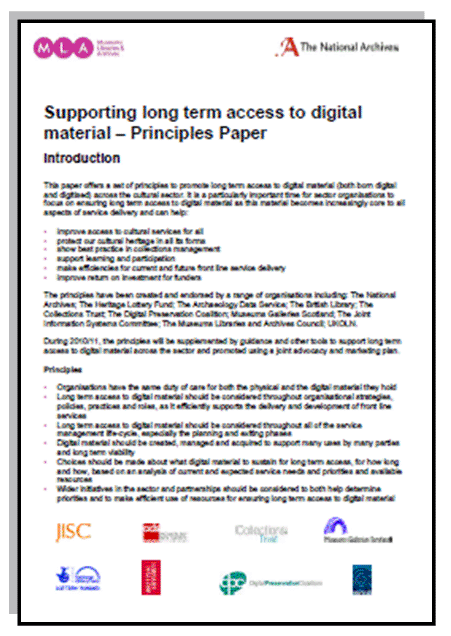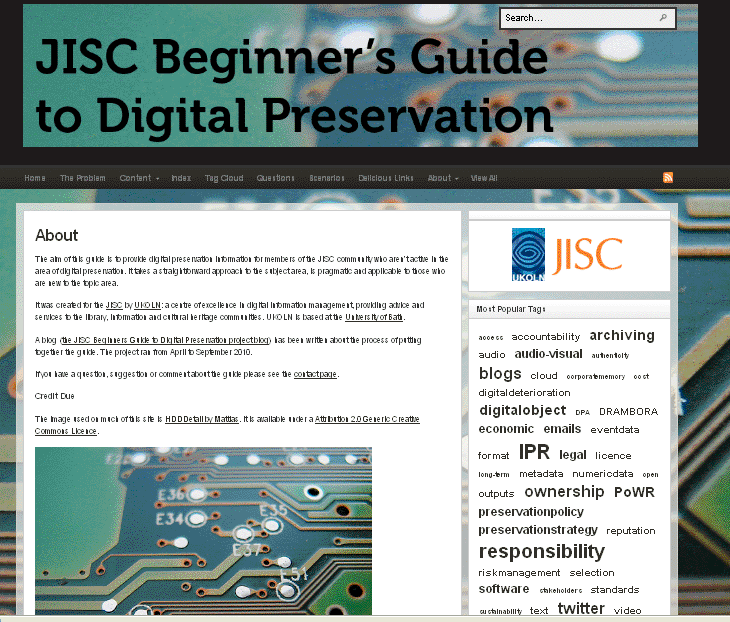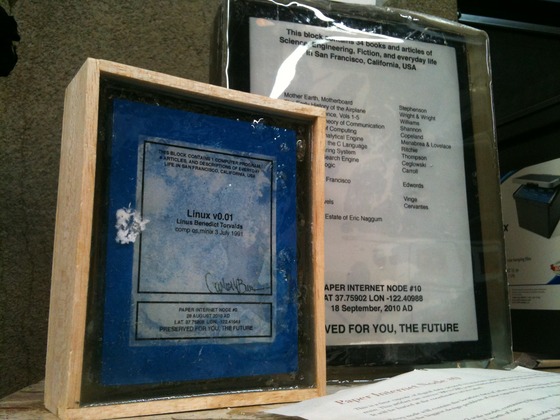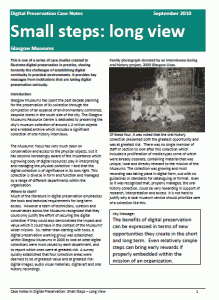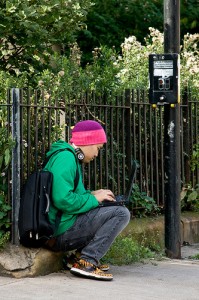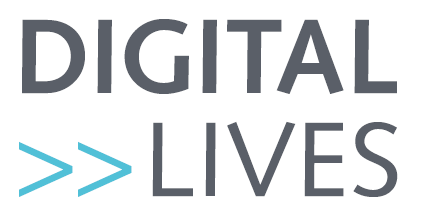New JISC Digital Preservation Projects
Posted by Marieke Guy on 17th February 2011
Neil Grindley, programme manager at JISC, has kindly passed on details of 5 forthcoming digital preservation projects.
Preservation Tools Projects
15/10 Programme (Infrastructure for Education and Research)
6 Month projects (February – July 2011)
Total project cost = JISC funding up to £60,000 per project + institutional contributions
Projects Summary
AQUA – Automated Quality Assurance
University of Leeds; University of York, The British Library, Open Planets Foundation
Total Project cost – £96,629
Manual quality assurance (QA) of digitised content is typically fallible and can result in collections that are marred by a variety of quality issues. Poor storage conditions can result in further damage due to bit-rot. Detecting, identifying and fixing these issues in legacy digitised collections are costly and time consuming manual processes. The Automating Quality assurance Project (AQuA) will apply a variety of existing tools in order to automatically detect quality issues in digitised collections.
Two AQuA events will bring together digital preservation practitioners, collection curators and technical experts to present problematic digitised collections, articulate requirements for their validation, and apply tools to automate the detection and identification of preservation and quality issues. Strong sustainability, take up and dissemination of project results will be ensured by facilitating cross pollination in events that bring together experts from a cross section of organisations and disciplines, and leveraging OPF’s existing role and expertise in preservation
technology support.
EPIC – Evaluating PLATO in Cambridge
University of Cambridge
Total Project Cost – £58,707
EPIC will investigate ways of improving the preservation services currently provided with DSpace@Cambridge. A key activity of the project will be to explore the feasibility of using Plato and associated Planets tools for preservation planning and relevant preservation activities. It will identify a small number of deposited collections that are at risk and use Plato to investigate preservation options and develop plans for them.
In order to inform the planning and evaluate the results we will engage with user communities, seeking to capture their understanding of the significant properties which must be preserved. While the focus of the project is on preservation planning, we expect to carry out preservation actions on some collections. In other cases experiments will be conducted to identify potential future actions.
FIDO – Forensic Investigation of Digital Objects
Centre for e-Research, King’s College London; Archives & Information Management (AIM) Service, King’s College London
Total Project Cost – £42,301
The project aims to investigate the application of digital forensics to support the curation and preservation of digital information held on computer systems and digital media. The project will evaluate the suitability of digital forensic principles and practices to enable HE archives to meet organisational commitments and legal requirements for maintaining digital records; assess the effectiveness of using open source digital forensic tools to identify, acquire, and analyse digital information; and seek to embed digital forensics tools & techniques into the working practices of the KCL Archives & Information Management (AIM).
KRDS/I2S2 – Digital Preservation Benefit Analysis Tools
UKOLN, University of Bath; University College London; UK Data Archive; Archaeology, Charles Beagrie Ltd
Data Service; OCLC Research
Total Project Cost – £69,810
The project aims to test, review and promote combined use of the Keeping Research Data Safe (KRDS) Benefits Taxonomy and the I2S2 Value Chain Analysis tools for assessing the benefits of digital preservation of research data. It will extend their utility to and adoption within the JISC community by providing user review and guidance for the tools and creating an integrated toolset. The project consortium consists of a mix of user institutions, projects, and disciplinary data services committed to the testing and exploitation of these tools and the lead partners in their original creation (Neil Beagrie of Charles Beagrie Ltd and Brian Lavoie of OCLC Research). The project will be undertaken in seven work packages that demonstrate and critique the tools, and then create and disseminate the toolset and accompanying materials such as User Guides and Factsheets to the wider community.
SWORD – Software Ontology for Resource Description
University of Manchester; The European Bioinformatics Institute
Total Project Cost – £46,944
SWORD will build on existing work to produce a Software Ontology (SWO) and the workflow for developing and applying the SWO to data. Our primary use case exists in bioinformatics. The life sciences are rapidly producing data; these primary data are then analysed and described using a variety of means. To gain scientific value from these data we need to know how they were produced and analysed; this requires software descriptions. We will seek to engage with a wide variety of organisations and disciplinary areas to validate the work. A controlled vocabulary capturing software tools, their types, tasks, versions, provenance, and so on will help preserve our important scientific data and increase its worth.
Posted in Project news | 1 Comment »
